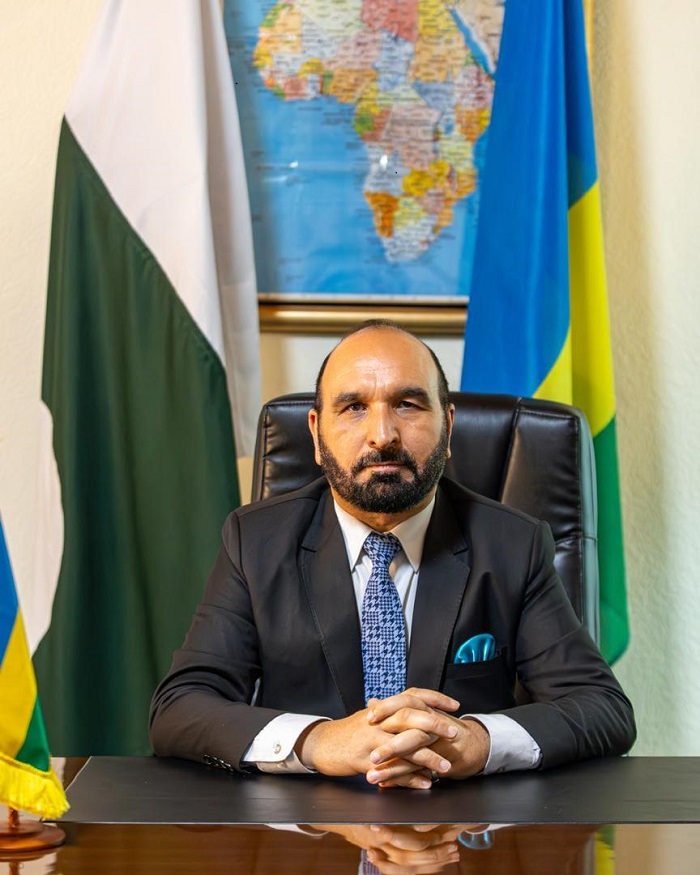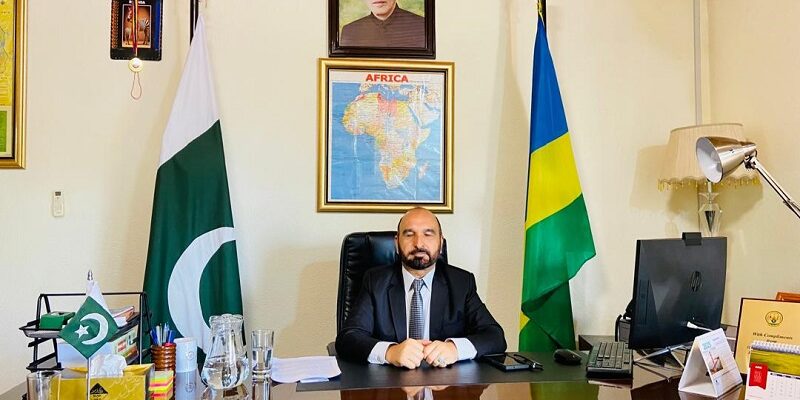The High commissioner of Pakistan to Rwanda and Ambassador to Angola and Burundi, Ambassador NAEEM Khan calls international community to support all initiatives for peace talks between his country Pakistan and India.
In interview with PAX PRESS, Ambassador NAEEM Khan, condemned the recent attack of India to Pakistan on many civilian establishments, where many people died and others have got injured. “The position of Pakistan is that Pakistan is available for any Peace talks, available to resolve all pending issues, including Kashimir, which is a disputed area with India”, said Ambassador NAEEM Khan. “Pakistan invites all friend countries and the international community to come and help to set peace talks process in this region”, he added.
The Pakistani representative to Rwanda recalls that both India and Pakistan are nuclear armed countries, (both have nuclear weapons). And if the conflict persists it can lead to the use of nuclear arms. “Any disaster from the use of nuclear arms will not be only for both countries but it will be harmful for the whole world”, alerts Ambassador NAEEM Khan.
Hostilities between India and Pakistan have intensified after the killing of 26 people by gunmen in an attack in Pahalgam in Indian-administered Kashmir, on 22 April 2025. India accused Pakistan to support terrorism in Indian-administered Kashmir, but Islamabad has denied any involvement. The aftermath has led to a series of reprisals and raised fear of military escalation between the two nuclear-armed rivals.
In the wake of the attack, tit-for-tat measures by India and Pakistan have driven bilateral relations to their lowest point in recent years. New Delhi first took measures to downgrade ties with Pakistan, suspending the Indus Waters Treaty, terminating a visa-free travel regime with Pakistan, and closing the Attari border crossing between the two countries. Indian security forces have arrested over 1,500 Kashmiris and demolished homes of suspected militants.
In turn, Pakistan rejected the suspension of the water treaty, warning that any attempts to alter Pakistan’s Indus River flows would be considered “an act of war.” Islamabad also moved to close Pakistani airspace to all Indian commercial airlines, halted a special visa regime for Indian citizens, and suspended bilateral trade. After a militant attack in Kashmir, the Indian government said it was suspending its participation in a treaty that governs most of the water used in Pakistani agriculture.
Violation of Indus Water Treaty as serious Human rights concern
The High commissioner of Pakistan to Rwanda revealed that “one of the serious issues which is causing the persistence of this conflict is the violation of the Indus Water Treaty”. For him, India unilaterally withdrew from the Indus Water Treaty, without giving any notice to other signatory parties. The World Bank said it would not intervene in the dispute as its role in the treaty was limited to that of a facilitator.
On 23 April 2025, following a terrorist attack near Pahalgam in Kashmir, the Government of India declared the suspension of the treaty with Pakistan citing national security concerns. India threatens to stop the water coming to Pakistan. This will cause many problems on agriculture, on industries, and on the public health. Ambassador NAEEM Khan notes that “water should not be weaponised. Water should not be used as a weapon against anyone, any country even if is considered as enemy, because it a humanity involved”. “If India stops water to Pakistan, It is putting in danger the life of 250 Millions people. It is a big number of humanity”, he added.
After a militant attack in Kashmir, the Indian government said it was suspending its participation in a treaty that governs most of the water used in Pakistani agriculture.
The Indus Water Treaty was a water-distribution treaty between India and Pakistan, arranged and negotiated by the World Bank, to use the water available in the Indus River and its tributaries. It was signed in Karachi on 19 September 1960 by Indian prime minister Jawaharlal Nehru and Pakistani president Ayub Khan.
The Indus Waters Treaty allowed Pakistan to control waters from three western rivers, the Indus, Jhelum, and Chenab, while granting India access to the eastern rivers, Ravi, Sutlej, and Beas. These rivers are crucial for Pakistan, providing around 80% of its water used for irrigation and drinking purposes. Much of the headwaters are located in India, despite most irrigation systems falling in Pakistan. “There is a greater dependency on this basin for Pakistan than there is for India”, note experts.

For His Excellency Ambassador Naeem Khan “water should not be weaponized”
Stop accusing each other of terrorism to avoid escalation of war
On April 22, 2025, tensions escalated after militants attacked Indian tourists in Kashmir, killing twenty-five Indian nationals and one Nepalese national. India blamed Pakistan for harboring the group responsible for the attack and arrested two Pakistani nationals as suspects. Pakistan denied any involvement.
India affirms this was a terrorist activity done by The Resistance Front (TRF). India accuses Pakistan for supporting this terrorist group. The representative of Pakistan in Rwanda, Angola and Burundi, Ambassador Khan rejects these allegations. “We invite the entire international community to come and set if India has any proof showing that Pakistan is involved in any terrorism activity”, states Ambassador Naeem Khan.
On April 24, Indian Prime Minister Narendra Modi stood before a crowd in the northern state of Bihar and declared: “India will identify and punish every terrorist and their backers. We will pursue them to the ends of the earth. India’s spirit will never be broken by terrorism. Terrorism will not go unpunished.”
On his side, Pakistan affirms also to have very strong evidences that India is involved in many terrorist activities in Pakistan especially in the province of Balochistan, located in the southwestern region of the country. Pakistani officials say they have shown and are ready to show to international community how India is involved in terrorist activities in Pakistan.
On behalf of the Pakistani Government, Ambassador Khan advocates for an independent investigation into the attack and its suspects so that the real responsible can be revealed and punished. “Pakistan is committed to fight any terrorism activities and punish anyone involved in terrorist actions”, insists the Pakistani representative.
Like other pakistani officials, Ambassador khan reaffirms that “accusing each other of terrorism is not the solution but negotiations and cooperation aiming to restore peace in the entire region is a priority”. Both countries should seat around the peace table and resolve all pending conflicts. “There is a possibility of restabling peace, as Pakistan wants peace, the neighbour should want peace too”, hopes the Pakistani diplomat. “Each country should focus on the resolution of its internal problems, such jobs, employment, making scientific development instead of fighting”, advises Ambassador Khan.
The Prime Minister of Pakistan, Shehbaz Sharif declared that “Pakistan ready for peace talks”. Pakistan’s Prime Minister Shehbaz Sharif has expressed willingness to engage in peace talks with India. During his visit to Iran, Sharif emphasized the need for dialogue to resolve all outstanding issues between the two nuclear-armed neighbors. Sharif said, “Peace between Pakistan and India will not only benefit our two countries but also contribute to regional peace and prosperity.”
Pakistan in brief
The Islamic Republic of Pakistan, is a country in South Asia, considered a large and significant country in Asia, both in terms of population and area. It is the 9th largest country in Asia by area and 5th largest by population, with around 250 millions people, making it one of the most populous countries in the world and Asia, having the second-largest Muslim population as of 2023. Islamabad is the nation’s capital, while Karachi is its largest city and financial centre.
Kashmir in brief
The Kashmir conflict is a long-standing dispute between India and Pakistan, with Indian-Administered Kashmir and Pakistan-Administered Kashmir.
In 1989, an armed insurgency erupted against Indian rule in Indian-administered Kashmir Valley seeking creation of an independent state based on demands for self determination. Ambassador Naeem Khan reveals that Pakistan proposes to organize a referendum for the people of Kashimir so that they can decide by themselves if they want to join Pakistan or India.
Counterinsurgency by the Indian government was coupled with repression of the local population and increased militarisation of the region, while various insurgent groups engaged in a variety of criminal activity.
According to scholars, Indian forces have committed many human rights abuses and acts of terror against the Kashmir civilian population, including extrajudicial killing, rape, torture, and enforced disappearances. Human rights defenders have also accused the Indian government of refusing to prosecute perpetrators of abuses in the region.
Albert Baudouin Twizeyimana
Peace Journalism Trainer/PAX PRESS







